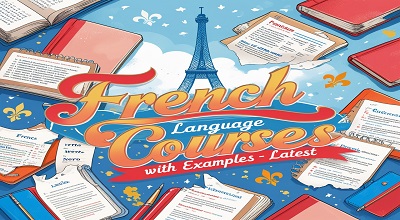French Language Courses
French Language Courses: Learning French opens doors to cultural enrichment, career opportunities, and global communication. With the latest advancements in language education, French courses now incorporate interactive methods, real-life examples, and digital tools to enhance learning. This article explores the best French language courses available, their methodologies, and practical examples to help learners master the language efficiently.
Why Learn French?
French is spoken by over 300 million people worldwide and is an official language in 29 countries. It is the language of diplomacy, international business, and renowned literature. Learning French provides:
- Career Advantages in multinational companies, NGOs, and diplomatic services.
- Academic Opportunities in top universities in France, Canada, and Switzerland.
- Cultural Access to French cinema, literature, and art.
Types of French Language Courses
1. Online French Courses
Platforms like Duolingo, Babbel, and Rosetta Stone offer structured lessons with interactive exercises.
Example:
- Duolingo’s French Course includes gamified lessons where learners match words to images, enhancing vocabulary retention.
2. University & Certification Programs
Institutions like Alliance Française and Sorbonne University provide certified courses (DELF, DALF).
Example:
- DELF A1 Exam Preparation includes listening exercises where students identify spoken words in everyday scenarios.
3. Private Tutoring & Immersion Programs
Websites like iTalki and Preply connect learners with native French tutors.
Example:
- A tutor may use role-playing exercises (e.g., ordering food in a French café) to improve conversational skills.
4. Mobile Apps & AI-Based Learning
Apps like Memrise and Busuu use AI to personalize lessons.
Example:
- Busuu’s speech recognition helps learners perfect pronunciation by comparing their speech to native speakers.
Latest Trends in French Language Learning
- Virtual Reality (VR) Classes – Simulated environments like Parisian streets for immersive learning.
- Chatbots for Practice – AI chatbots engage learners in French conversations.
- Hybrid Learning Models – Combining online self-study with live tutor sessions.
Practical Examples in French Courses
Grammar Example: Present Tense
- Sentence: Je mange une pomme. (I eat an apple.)
- Exercise: Convert to negative – Je ne mange pas une pomme.
Vocabulary Example: Food Terms
- Words: Pain (bread), Fromage (cheese), Vin (wine)
- Exercise: Create a sentence – Je mange du pain avec du fromage.
Conversation Example: Greetings
- Dialogue:
- Bonjour, comment ça va ? (Hello, how are you?)
- Ça va bien, merci ! Et toi ? (I’m fine, thanks! And you?)
Choosing the Right French Course
Consider:
- Skill Level (Beginner, Intermediate, Advanced)
- Learning Style (Visual, Auditory, Kinesthetic)
- Budget (Free vs. Paid Courses)
Conclusion
The latest French language courses combine technology, expert instruction, and practical examples to make learning engaging and effective. Whether through apps, universities, or private tutors, mastering French has never been more accessible.
FAQs About French Language Courses
1. What is the best online French course for beginners?
Answer: Duolingo and Babbel are excellent for beginners due to their structured, interactive lessons.
2. How long does it take to become fluent in French?
Answer: With consistent practice (3-5 hours/week), learners can reach B2 level in 1-2 years.
3. Are certification exams like DELF necessary?
Answer: Yes, DELF/DALF certifications are recognized globally and useful for academic/professional purposes.
4. Can I learn French for free?
Answer: Yes, platforms like Duolingo, OpenCulture, and BBC French offer free resources.
5. What’s the best way to practice speaking French?
Answer: Engage in conversation with native speakers via iTalki, Tandem, or language exchange meetups.
Free Download Link: Rogue Company Elite APK
